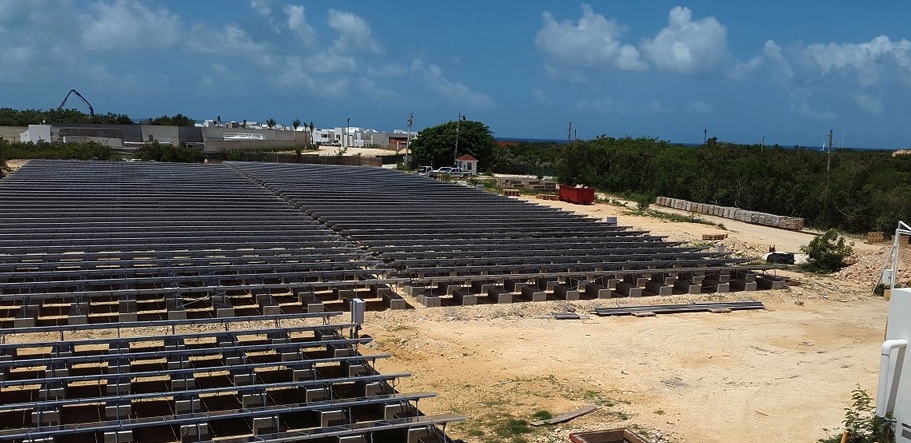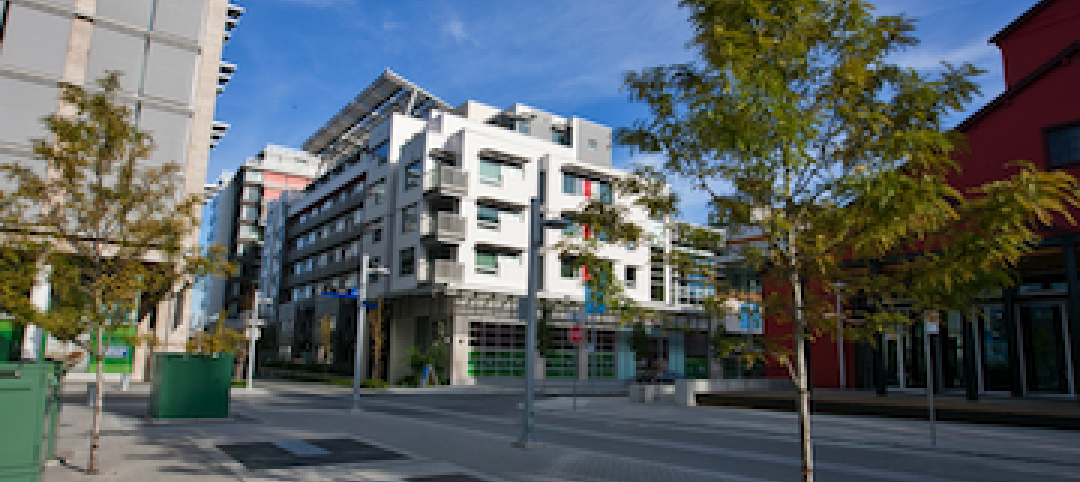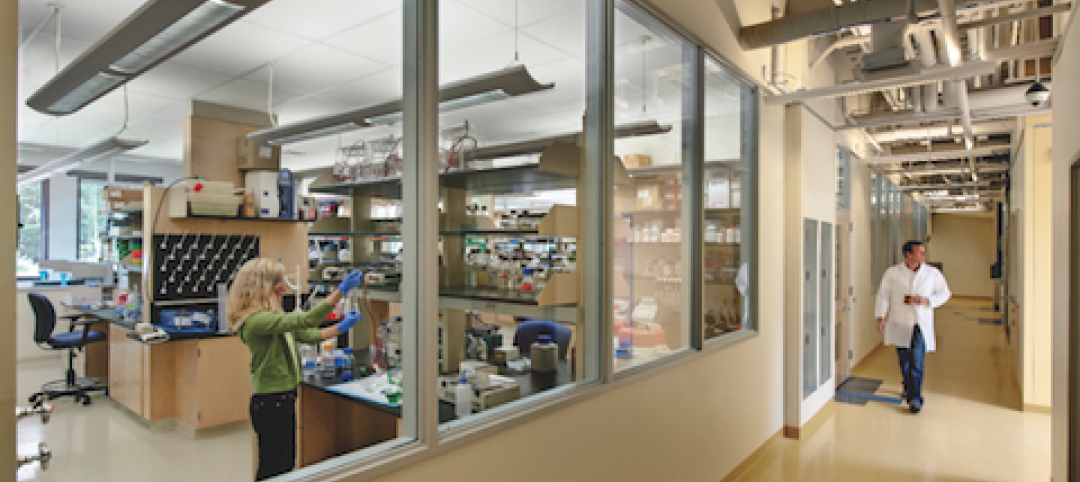Strapped with both water and energy crises, several island nations are investing in solar-powered water plants to attain more resilient water and power sources, according to executives of a major international resort chain.
One of the latest examples is the CuisinArt Golf Resort & Spa’s new installation in Anguilla, an island in the British West Indies east of Puerto Rico. The innovative solar generation system powers the resort’s reverse-osmosis water plant, and it is seen as a model for similarly situated Caribbean islands and hospitality operators.
Working with GE and Inovateus Solar, a South Bend, Ind.-based photovoltaic system developer, CuisinArt, installed its own 1.0-MW solar power generation plant with a battery backup system to store energy. In this way, says Rory Purcell, the resort’s chief engineer, the off-grid plant will provide an uninterruptible energy supply for the reverse-osmosis (RO) water treatment system.
The RO plant filters and desalinates supply water, creating potable “solar water” to the residents on the island, guests of the resort and irrigation water for the golf course, says Purcell.
The project—designed and constructed by CuisinArt and Inovateus with the contractors SwitchLogix and PDE Total Energy Solutions—has been designed in such a way that it is completely isolated from the grid. It also has the unique benefit of being able to reconnect partial loads, in a discretionary way, to continue to desalinate outside solar production hours. For those hours when the sun is down, it depends on the local utility, Anguilla Electricity Company Ltd.
Anguilla recently joined the group Carbon War Room’s Ten-Island Challenge to reduce the Caribbean’s carbon footprint, and the CuisinArt plant is the first major foray into renewables for the island. The new solar plant saves 1.2 million pounds of carbon dioxide emissions annually, says Inovateus executive Peter Rienks. “The payback on this project will immediately save CuisinArt hundreds of thousands of dollars per year. Even more important, it provides a solution to the global water crisis,” he explains. “This system could be duplicated on any island in any country around the world.”
According to CuisinArt’s Purcell, the initiative is both viable and secure. “It is a proven strategy to penetrate the national demand with renewable energy far in excess of the usual grid-tied limits,” he says. PV is a low “environmental impact source, designed to withstand Category 5 hurricanes, low-flying objects and poorly directed golf balls,” he chuckles. “It has low maintenance requirements with a life expectancy in excess of 25 years.”
The new solar array supports the plant’s daily capacity of 1.25 million gallons of fresh water, which serves the 130-key resort and its Greg Norman Signature Golf Course, as well as the new 80-key Reef Hotel, an associated spa and six full-service restaurants. CuisinArt also operates hydroponic and organic farms, a 500,000-square-foot residential estate, and -- of course -- an extensive irrigation system.
“CuisinArt has set a sustainable precedent for photovoltaic water purification throughout the world,” says Peter Foss an executive with GE. “Not only will the project have a great return on investment, it will also help reduce the island’s dependence on fossil fuels and help create a cleaner environment for generations to come.”
Related Stories
| Nov 9, 2010
Turner Construction report: Green buildings still on the agenda
Green buildings continue to be on the agenda for real estate owners, developers, and corporate owner-occupants, according to the Turner 2010 Green Building Market Barometer. Key findings: Almost 90% of respondents said it was extremely or very likely they would incorporate energy-efficiency improvements in their new construction or renovation project, and 60% expected to incorporate improvements to water efficiency, indoor environmental quality, and green materials.
| Nov 2, 2010
11 Tips for Breathing New Life into Old Office Spaces
A slowdown in new construction has firms focusing on office reconstruction and interior renovations. Three experts from Hixson Architecture Engineering Interiors offer 11 tips for office renovation success. Tip #1: Check the landscaping.
| Nov 2, 2010
A Look Back at the Navy’s First LEED Gold
Building Design+Construction takes a retrospective tour of a pace-setting LEED project.
| Nov 2, 2010
Yudelson: ‘If It Doesn’t Perform, It Can’t Be Green’
Jerry Yudelson, prolific author and veteran green building expert, challenges Building Teams to think big when it comes to controlling energy use and reducing carbon emissions in buildings.
| Nov 1, 2010
Sustainable, mixed-income housing to revitalize community
The $41 million Arlington Grove mixed-use development in St. Louis is viewed as a major step in revitalizing the community. Developed by McCormack Baron Salazar with KAI Design & Build (architect, MEP, GC), the project will add 112 new and renovated mixed-income rental units (market rate, low-income, and public housing) totaling 162,000 sf, plus 5,000 sf of commercial/retail space.
| Nov 1, 2010
Vancouver’s former Olympic Village shoots for Gold
The first tenants of the Millennium Water development in Vancouver, B.C., were Olympic athletes competing in the 2010 Winter Games. Now the former Olympic Village, located on a 17-acre brownfield site, is being transformed into a residential neighborhood targeting LEED ND Gold. The buildings are expected to consume 30-70% less energy than comparable structures.
| Oct 21, 2010
GSA confirms new LEED Gold requirement
The General Services Administration has increased its sustainability requirements and now mandates LEED Gold for its projects.
| Oct 13, 2010
Editorial
The AEC industry shares a widespread obsession with the new. New is fresh. New is youthful. New is cool. But “old” or “slightly used” can be financially profitable and professionally rewarding, too.
| Oct 12, 2010
University of Toledo, Memorial Field House
27th Annual Reconstruction Awards—Silver Award. Memorial Field House, once the lovely Collegiate Gothic (ca. 1933) centerpiece (along with neighboring University Hall) of the University of Toledo campus, took its share of abuse after a new athletic arena made it redundant, in 1976. The ultimate insult occurred when the ROTC used it as a paintball venue.
| Oct 12, 2010
Cell and Genome Sciences Building, Farmington, Conn.
27th Annual Reconstruction Awards—Silver Award. Administrators at the University of Connecticut Health Center in Farmington didn’t think much of the 1970s building they planned to turn into the school’s Cell and Genome Sciences Building. It’s not that the former toxicology research facility was in such terrible shape, but the 117,800-sf structure had almost no windows and its interior was dark and chopped up.















